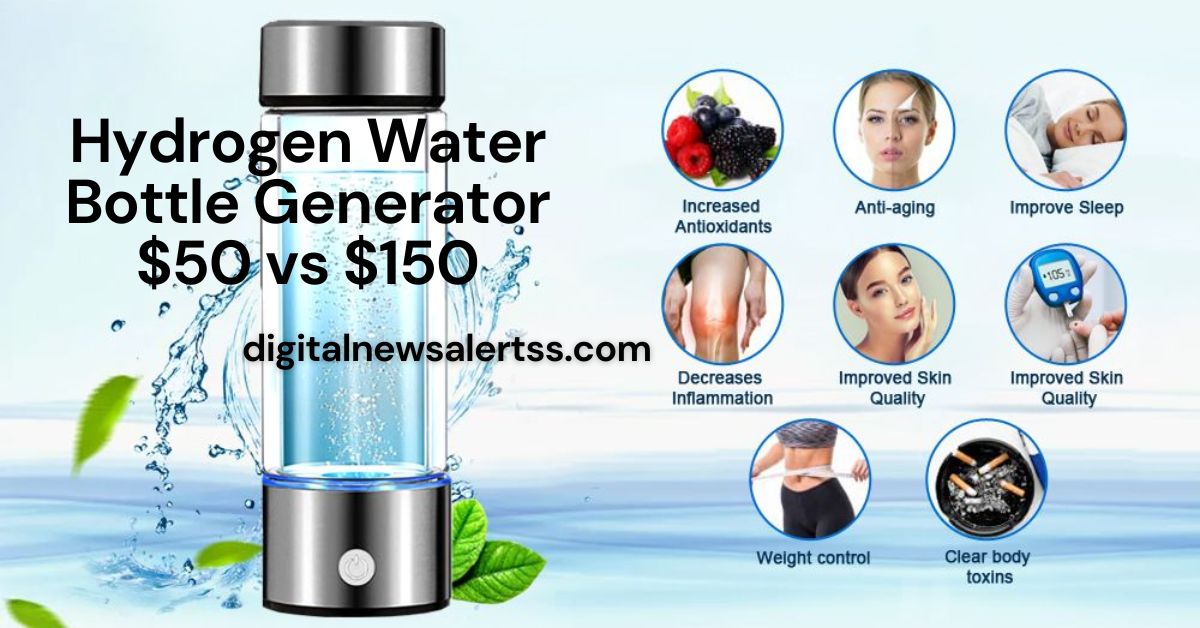Are you curious about the buzz surrounding hydrogen water? Maybe you’ve heard claims about its potential health benefits and are considering purchasing a hydrogen water bottle generator. But with options ranging from $50 to $150 or more, how do you know which one to choose? In this comprehensive guide, we’ll explore the world of hydrogen water bottle generators, comparing $50 and $150 options to help you make an informed decision.
What is a Hydrogen Water Bottle Generator?
Before we dive into the comparison, let’s understand what a hydrogen water bottle generator actually is. These devices are designed to infuse regular water with extra hydrogen gas, creating what’s known as “hydrogen-rich water” or simply “hydrogen water.”
The process works by using electrolysis to split water molecules (H2O) into hydrogen (H2) and oxygen (O2). The hydrogen gas is then dissolved back into the water, increasing its concentration. Proponents of hydrogen water claim it may offer various health benefits, though it’s important to note that research in this area is ongoing.
Hydrogen Water Bottle Generator $50 vs $150: Key Differences
When you’re in the market for a hydrogen water bottle generator, you’ll find a wide range of prices. Let’s break down the main differences between the budget-friendly $50 options and the more premium $150 models.
1. Build Quality and Materials
$50 Models:
- Often made with lower-grade plastics
- May have a less durable feel
- Typically lighter in weight
$150 Models:
- Usually constructed with higher-quality materials
- May include stainless steel or glass components
- Generally more robust and durable
2. Hydrogen Concentration
$50 Models:
- Lower hydrogen concentration, often around 0.5-0.8 parts per million (ppm)
- May take longer to achieve maximum concentration
$150 Models:
- Higher hydrogen concentration, typically 1.0-1.5 ppm or more
- Faster process for reaching maximum concentration
3. Battery Life and Charging
$50 Models:
- Smaller battery capacity
- May require more frequent charging
- Often use older battery technology
$150 Models:
- Larger battery capacity
- Longer usage time between charges
- May feature fast charging or wireless charging options
4. Additional Features
$50 Models:
- Basic functionality
- Simple on/off operation
- Limited or no display options
$150 Models:
- Advanced features like multiple operating modes
- Digital displays showing hydrogen concentration or battery life
- Some may offer smartphone app connectivity
5. Design and Portability
$50 Models:
- Basic designs
- May be bulkier or less aesthetically pleasing
- Generally lightweight for easy carrying
$150 Models:
- Sleeker, more modern designs
- Often more compact and portable
- May come in various color options
6. Warranty and Customer Support
$50 Models:
- Limited warranty, typically 30-90 days
- Basic customer support
$150 Models:
- Longer warranties, often 1 year or more
- More comprehensive customer support, sometimes including dedicated phone lines or chat support
Pros and Cons: $50 Hydrogen Water Bottle Generators
Pros:
- Affordable entry point for trying hydrogen water
- Lightweight and easy to carry
- Simple to use with basic operations
- Lower initial investment if you’re unsure about long-term use
Cons:
- Lower hydrogen concentration
- May not be as durable or long-lasting
- Limited features and functionality
- Shorter battery life and slower charging
Pros and Cons: $150 Hydrogen Water Bottle Generators
Pros:
- Higher hydrogen concentration for potentially better results
- Better build quality and durability
- Advanced features for a more customized experience
- Longer battery life and improved charging options
- Often more aesthetically pleasing designs
Cons:
- Higher initial cost
- May have a steeper learning curve with more features
- Could be overkill if you’re just starting out with hydrogen water
- Potentially more expensive to replace if lost or damaged
Who Should Choose a $50 Hydrogen Water Bottle Generator?
A $50 hydrogen water bottle generator might be the right choice for:
- Beginners: If you’re new to hydrogen water and want to try it without a big investment, a $50 model can be a good starting point.
- Occasional Users: Those who plan to use hydrogen water only occasionally may find a basic model sufficient for their needs.
- Budget-Conscious Consumers: If you’re interested in hydrogen water but have limited funds, a $50 option allows you to experience the potential benefits without breaking the bank.
- Travelers: The lightweight and simple design of many $50 models makes them easy to pack for trips.
- Skeptics: If you’re unsure about the benefits of hydrogen water and want to test it out, a lower-cost option presents less financial risk.
Who Should Choose a $150 Hydrogen Water Bottle Generator?
A $150 hydrogen water bottle generator might be better suited for:
- Enthusiasts: If you’re already convinced of the benefits of hydrogen water and want the best possible experience, a premium model could be worth the investment.
- Daily Users: Those who plan to incorporate hydrogen water into their daily routine may appreciate the higher quality and additional features of a $150 model.
- Tech-Savvy Individuals: If you enjoy gadgets with advanced features and potentially app connectivity, a higher-end model might be more satisfying.
- Health-Focused Consumers: For those deeply invested in their health and willing to spend more on potential wellness benefits, a $150 model offers higher hydrogen concentration.
- Design-Conscious Buyers: If aesthetics are important to you, the sleeker designs of many $150 models might be more appealing.
Making the Most of Your Hydrogen Water Bottle Generator
Regardless of whether you choose a $50 or $150 model, here are some tips to get the most out of your hydrogen water bottle generator:
- Follow Instructions Carefully: Each model may have specific usage guidelines. Follow them closely for the best results.
- Clean Regularly: Keep your bottle clean to ensure the best taste and prevent any buildup that could affect performance.
- Use Filtered Water: Starting with clean, filtered water can improve the taste and potentially the effectiveness of the hydrogen infusion process.
- Be Consistent: If you’re using hydrogen water for potential health benefits, consistency is key. Try to incorporate it into your daily routine.
- Stay Hydrated: Remember, the most important aspect of any water bottle is encouraging you to stay hydrated throughout the day.
- Monitor Battery Life: Keep an eye on your device’s battery life and charge it regularly to ensure it’s always ready when you need it.
- Store Properly: When not in use, store your hydrogen water bottle generator in a cool, dry place to maintain its longevity.
The Science Behind Hydrogen Water
While the concept of hydrogen water is relatively new in the consumer market, research into its potential benefits has been ongoing for several years. Here’s a brief overview of some scientific findings:
- Antioxidant Properties: Hydrogen is thought to act as a selective antioxidant, potentially helping to neutralize harmful free radicals in the body.
- Anti-Inflammatory Effects: Some studies suggest that hydrogen-rich water may have anti-inflammatory properties, which could be beneficial for various health conditions.
- Athletic Performance: There’s emerging research on the potential of hydrogen water to improve exercise performance and recovery, though more studies are needed.
- Metabolic Health: Some preliminary studies have looked at the effects of hydrogen water on metabolic markers, with mixed but promising results.
It’s important to note that while these studies are intriguing, much of the research is still in early stages. More large-scale, long-term studies are needed to fully understand the potential benefits and limitations of hydrogen water.
Environmental Considerations
When choosing between a $50 and $150 hydrogen water bottle generator, it’s worth considering the environmental impact:
- Durability: Higher-end models may last longer, potentially reducing electronic waste over time.
- Plastic Use: Consider models that use less plastic or incorporate more sustainable materials.
- Energy Efficiency: Some premium models may be more energy-efficient, using less power to produce hydrogen-rich water.
- Recyclability: Look into whether the manufacturer offers recycling programs for their products at the end of their lifecycle.
The Future of Hydrogen Water Technology
As interest in hydrogen water grows, we’re likely to see continued innovation in this field:
- Improved Efficiency: Future models may be able to produce higher concentrations of hydrogen more quickly and efficiently.
- Smart Technology Integration: We might see more hydrogen water bottles with app connectivity, allowing users to track their hydration and customize their hydrogen water production.
- Sustainable Materials: As eco-consciousness grows, manufacturers may start using more recycled or biodegradable materials in their products.
- Portable Hydrogen Generators: We may see the development of even more portable options that can turn any water source into hydrogen-rich water on the go.
Making Your Decision: Hydrogen Water Bottle Generator $50 vs $150
When deciding between a $50 and $150 hydrogen water bottle generator, consider the following factors:
- Budget: How much are you willing to invest in this technology?
- Usage Frequency: Will you use it daily or just occasionally?
- Desired Features: Do you need advanced features, or is basic functionality enough?
- Hydrogen Concentration: Is achieving the highest possible concentration important to you?
- Durability: Do you need a robust device that can withstand frequent use and travel?
- Aesthetics: How important is the look and feel of the device to you?
- Long-Term Value: Consider the potential longevity and performance of each option over time.
Remember, the “best” choice depends on your individual needs and preferences. A $50 model might be perfect for one person, while another may find the additional features of a $150 model well worth the extra cost.
Conclusion
Hydrogen Water Bottle Generator $50 vs $150 have gained popularity as a convenient way to potentially boost the health benefits of drinking water. While the science is still evolving, many users report positive experiences with these devices.
When choosing between a $50 and $150 hydrogen water bottle generator, consider your budget, usage habits, and desired features. A $50 model can be a great entry point for those curious about hydrogen water, offering basic functionality at an affordable price. On the other hand, a $150 model typically offers higher hydrogen concentration, better build quality, and additional features that may enhance your overall experience.
Ultimately, the best choice is the one that fits your lifestyle and encourages you to stay hydrated. Whether you opt for a budget-friendly $50 model or invest in a premium $150 option, the most important thing is to use it consistently and enjoy your hydrogen-rich water as part of a balanced, healthy lifestyle.
FAQs about Hydrogen Water Bottle Generator $50 vs $150
Is hydrogen water safe to drink?
Yes, hydrogen water is generally considered safe to drink. It’s essentially regular water with extra dissolved hydrogen gas. However, as with any dietary change, it’s always a good idea to consult with your healthcare provider.
How long does the hydrogen stay in the water?
The hydrogen gas can start to dissipate fairly quickly once exposed to air. It’s best to drink the water soon after it’s been generated, ideally within 30 minutes to an hour for optimal hydrogen content.
Can I use any type of water in my hydrogen water bottle generator?
While you can use most types of water, filtered or purified water is recommended for the best taste and to prevent mineral buildup in your device.
How often should I clean my hydrogen water bottle generator?
It’s a good idea to clean your device at least once a week if you use it daily. Always follow the manufacturer’s specific cleaning instructions.
Will a more expensive hydrogen water bottle generator produce better results?
Generally, more expensive models can produce higher concentrations of hydrogen and may have better build quality. However, the actual health benefits may not necessarily be proportional to the price.
Can I over-consume hydrogen water?
There’s currently no evidence to suggest that drinking too much hydrogen water is harmful. However, as with regular water, it’s possible to drink too much in a short period, which can lead to water intoxication.
How long do hydrogen water bottle generators typically last?
The lifespan can vary greatly depending on the quality of the device and how well it’s maintained. A $50 model might last 6-12 months with regular use, while a $150 model could potentially last 2-3 years or more.
Are there any side effects to drinking hydrogen water?
Most people don’t experience any side effects from drinking hydrogen water. However, some individuals might experience mild digestive discomfort when first starting. If you have any concerns, consult with a healthcare professional.
Can I use my hydrogen water bottle generator for other beverages besides water?
It’s generally not recommended to use these devices with anything other than water. Other beverages may damage the device or affect its performance.
Do hydrogen water bottle generators require any special maintenance?
Most devices require regular cleaning and occasional descaling if you’re using hard water. Some higher-end models may have replaceable filters or electrodes that need periodic changing. Always refer to your specific model’s user manual for maintenance instructions.



